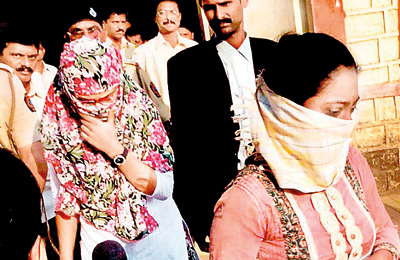Sunday Times 2
Indian government moves to quell Facebook and Twitter gag
As outrage over the draconian section 66A of the IT Act mounts – with even the Supreme Court jumping into the fray – the government on Thursday made a move to quell some of the discontent.
New guidelines allow only officers of rank deputy commissioner of police or higher to register cases under section 66A to prevent its misuse, with the bar being set at the level of inspector general of police in major cities.

As India moves to ease the draconian gag law, it emerged that the police will not go ahead and file a chargesheet in the court against Shaheen Dhadha (left) and her friend Renu Srinivas
“…The concerned police officer or police station may not register any complaints unless he has obtained prior approval at the level of an officer not below the DCP rank in urban and rural areas and IG level in metros,” sources said.
Meanwhile, the SC also expressed concern over the manner in which the police have handled cases involving section 66A, while hearing a PIL challenging its validity.
In a bid to have a holistic picture of the controversy, a bench presided over by Chief Justice Altamas Kabir asked the petitioner, a law student from Delhi, to serve a copy of her petition to Attorney General GE Vahanvati to ensure assistance from him.
Senior counsel Mukul Rohatgi, appearing for the petitioner, said the definition of the offence was vague and could be misused.
He said a criminal offence must be clear and precise but section 66A had words such as annoyance and inconvenience which had not been defined. Senior counsel Harish Salve, who was present in court, added that several interventions were likely to be filed as the issue was a matter of concern for all.
The court is likely to decide on Friday if a formal notice to the government is required, in which case the petitioner – Shreya Singhal – is likely to seek an interim stay on section 66A to prevent its misuse until the court has finished dealing with her petition.
Opening up a third front on the law, BJD MP Baijayant Jay Panda moved a private member’s Bill seeking to amend the IT Act to take away portions of the law that have prompted outrage over its affect on free speech.
“Today’s definition of the law equates annoying somebody with criminal intimidation. How can you possibly equate the two?” Panda said.
Both Panda and cyberlaw expert Pavan Duggal insisted that the new guidelines were only superficial attempts to quell the questioning of section 66A, rather than a serious admission of the potential for its misuse.
“A patient who is in the ICU needs to be given instantaneous life-saving medicines, not cosmetic treatments,” Duggal said.
“These guidelines do not change the law and the damocles sword of 66A will continue to hang.”
Panda also noted that the changes moved the discretion further up the chain rather than taking on the broad language within the section itself. Duggal pointed out that the SC would not have entertained the PIL without there being a problem in it.
To add to the mounting calls against the controversial section of the law, a petition calling for it to be amended garnered over 4,000 signatures online.
“This is not just a battle against one section but against an entire law which is being used to keep the citizens in check,” the petition, addressed to the telecom minister, said.
© Daily Mail, London
Follow @timesonlinelk
comments powered by Disqus























